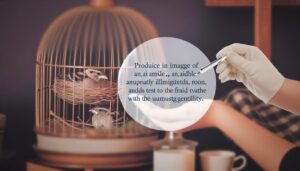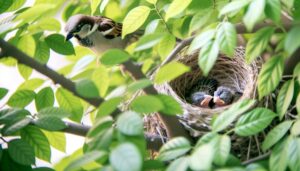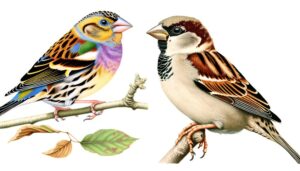How to Identify When Baby Sparrows Get Sick
Yes, baby sparrows can get sick. They may suffer from avian pox, bacterial infections like salmonellosis, and parasitic infestations such as mites and lice.
Signs of illness include unusual droppings, lethargy, nasal discharge, and labored breathing. Gastrointestinal issues may manifest as diarrhea or poor weight gain, while parasitic infestations can cause anemia and feather loss.
Maintaining a clean, disinfected habitat and promptly addressing symptoms with appropriate treatments, such as antibiotics or antiparasitics, are essential. Early detection and intervention can greatly improve their health outcomes.
To understand more deeply about preventing and treating these conditions, keep exploring further.
Key Takeaways
- Baby sparrows can suffer from respiratory infections, showing symptoms like nasal discharge and labored breathing.
- Gastrointestinal issues in baby sparrows manifest as diarrhea, regurgitation, and poor weight gain.
- Parasitic infestations, such as mites or lice, can cause anemia and feather loss in baby sparrows.
- Environmental factors like pollutants and temperature fluctuations can impair baby sparrows' immune systems and growth.
- Injuries from falls or predator attacks can lead to fractures, lacerations, and concussions in baby sparrows.
Common Illnesses
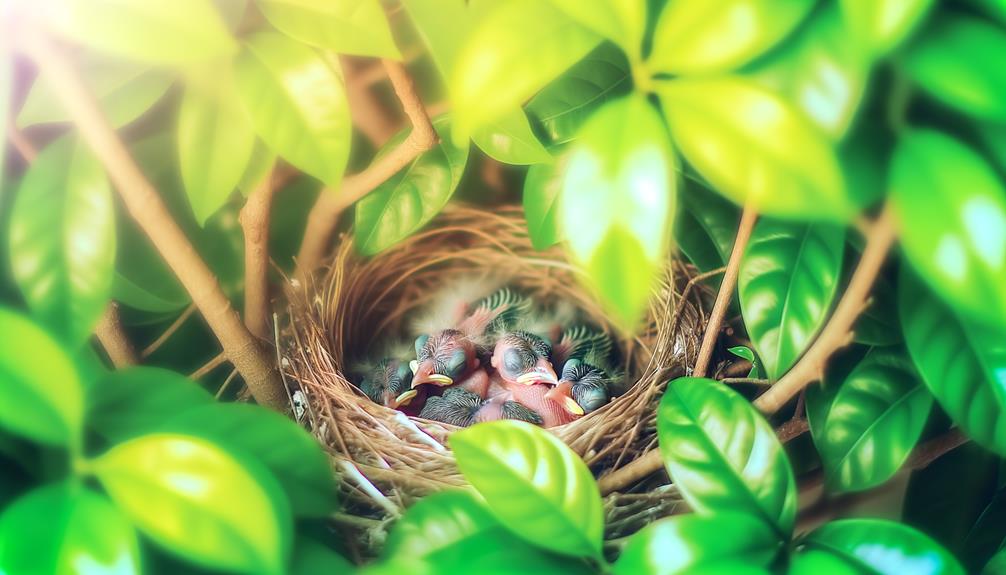
Common illnesses in baby sparrows include avian pox, bacterial infections, and parasitic infestations.
Avian pox presents as wart-like growths on the skin, caused by the Avipoxvirus.
You'll often find bacterial infections originating from unsanitary conditions, leading to ailments like salmonellosis. These infections may require antibiotic treatment.
Parasitic infestations, such as those caused by mites or lice, can severely affect a sparrow's health by causing anemia and distress.
Managing these conditions involves maintaining a clean habitat and monitoring for signs of infestation.
Understanding these common illnesses allows you to take proactive measures in preventing and treating them, ultimately ensuring the well-being of the baby sparrows under your care.
Signs of Sickness
When evaluating the health of baby sparrows, watch for unusual droppings, as these can indicate gastrointestinal issues or infections.
Additionally, lethargic behavior is a vital sign of potential illness, suggesting respiratory or metabolic disorders.
Promptly recognizing these symptoms can be essential for early intervention and treatment.
Unusual Droppings
Unusual excretions in baby sparrows can indicate underlying health issues, often reflecting infections, dietary problems, or systemic diseases. You should closely observe the consistency, color, and frequency of their excretions.
Diarrhea, greenish feces, or undigested food particles can point to gastrointestinal infections or malabsorption. Black, tarry stools might suggest internal bleeding. Consistently watery excretions could be a sign of stress or dehydration.
Changes in excretions' odor can also serve as indicators of bacterial or fungal infections. Always wear gloves when handling excretions for examination and maintain the nest's hygiene.
Early detection through vigilant monitoring will help you provide timely veterinary care, enhancing the baby sparrow's chance for recovery and well-being.
Lethargic Behavior
Observing sluggish behavior in baby sparrows, such as prolonged inactivity or reluctance to move, often signals underlying health issues that require immediate attention. When you notice these signs, it's important to act promptly.
Lethargy can indicate infections like avian pox or bacterial sepsis. Additionally, nutritional deficiencies, particularly in vitamins like B1, can manifest as decreased energy levels. You should also consider parasitic infestations, such as mites or lice, which drain a sparrow's vitality.
Conduct a thorough physical examination, observing for signs like labored breathing or visible lesions. Consulting an avian veterinarian for diagnostic tests, including blood work or fecal analysis, is essential. Early intervention can greatly improve the prognosis and overall health of the affected sparrow.
Respiratory Infections

When dealing with respiratory infections in baby sparrows, you should look for symptoms like nasal discharge, labored breathing, and lethargy.
Early detection and intervention are essential, so maintaining a clean environment and ensuring proper nutrition can help prevent these infections.
Implementing these preventative care measures will notably decrease the risk of respiratory ailments.
Common Symptoms Observed
Respiratory infections in baby sparrows often manifest through symptoms like labored breathing, nasal discharge, and audible wheezing. You'll observe that these symptoms can indicate conditions such as avian influenza or mycoplasmosis.
Labored breathing, characterized by rapid or strained respiration, often accompanies these infections. Nasal discharge, either clear or mucopurulent, signifies inflammation in the upper respiratory tract. Audible wheezing, a high-pitched sound during breathing, typically results from airway obstruction due to mucus or swelling.
Monitoring these symptoms is vital. Early detection and intervention can greatly improve outcomes. Document any changes in behavior or physical appearance. Seek veterinary care promptly if you notice persistent symptoms.
Your vigilant observation and timely action can make a crucial difference in the health of these vulnerable creatures.
Preventative Care Tips
To minimize the risk of respiratory infections in baby sparrows, implement strict hygiene protocols and ensure their living environment is clean and well-ventilated. Regularly change nesting materials to prevent mold and bacteria buildup. Guarantee the brooder is neither too hot nor too cold, maintaining ideal temperature to avoid stress-induced susceptibility to infections. Additionally, provide a balanced diet, rich in essential nutrients, to bolster their immune system.
| Prevention Tip | Reason | Emotional Impact |
|---|---|---|
| Clean Nesting Area | Reduces pathogens | Protects their innocence |
| Ideal Temperature | Prevents stress | Ensures their comfort |
| Balanced Nutrition | Boosts immunity | Fosters their strength |
Gastrointestinal Issues
Gastrointestinal issues in baby sparrows often manifest through symptoms like diarrhea, regurgitation, and poor weight gain, requiring prompt medical intervention. You should monitor for these signs, as they're indicative of underlying conditions such as bacterial infections, improper diet, or viral pathogens.
Administering probiotics can help balance their gut flora, while ensuring a sterile feeding environment minimizes infection risk. Immediate veterinary assistance is vital to perform diagnostic tests like fecal examinations or culture tests. Early intervention can prevent dehydration and nutrient malabsorption, which are common complications.
Parasitic Infestations
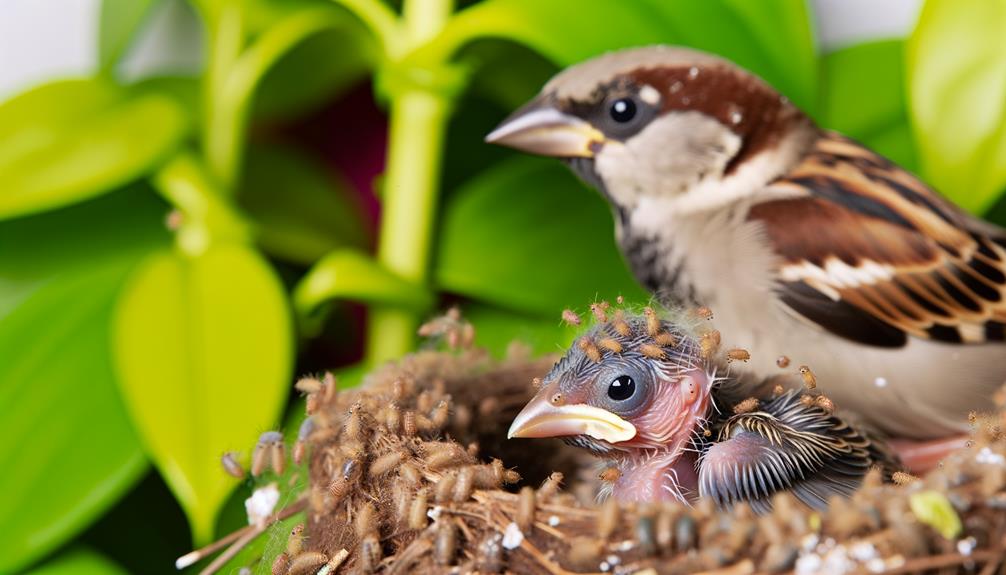
Parasitic infestations in baby sparrows often present through symptoms like feather loss, anemia, and lethargy, demanding immediate treatment to prevent severe health decline. Identifying mites, lice, and internal parasites is vital. Use a magnifying glass to inspect feathers and skin. Look for tiny moving specks or eggs attached to feather shafts.
Anemia can be detected by examining the color of the bird's mucous membranes; pale membranes indicate low blood cell count. Lethargy may manifest as reduced activity or prolonged resting. Administer prescribed antiparasitic medications promptly.
Maintain a clean environment, as parasites thrive in dirty nests. Regularly replace nesting materials and disinfect cages to minimize reinfestation risk. Your vigilance can greatly improve their chances of recovery.
Nutritional Deficiencies
Nutritional deficiencies in baby sparrows often result in stunted growth, weakened immune response, and developmental abnormalities, necessitating a balanced diet tailored to their specific needs. You must guarantee these young birds receive adequate protein, vitamins, and minerals.
Protein supports muscle growth and feather development, while vitamins like A and E are essential for immune function and cellular integrity. Calcium and phosphorus are crucial for bone health. Studies show that deficiencies in these nutrients can lead to conditions such as rickets or compromised immune defenses.
Providing a diet rich in insects and seeds can effectively meet these needs. Monitoring their growth and health closely can help you catch any deficiencies early, ensuring they develop into strong, healthy adults.
Environmental Hazards
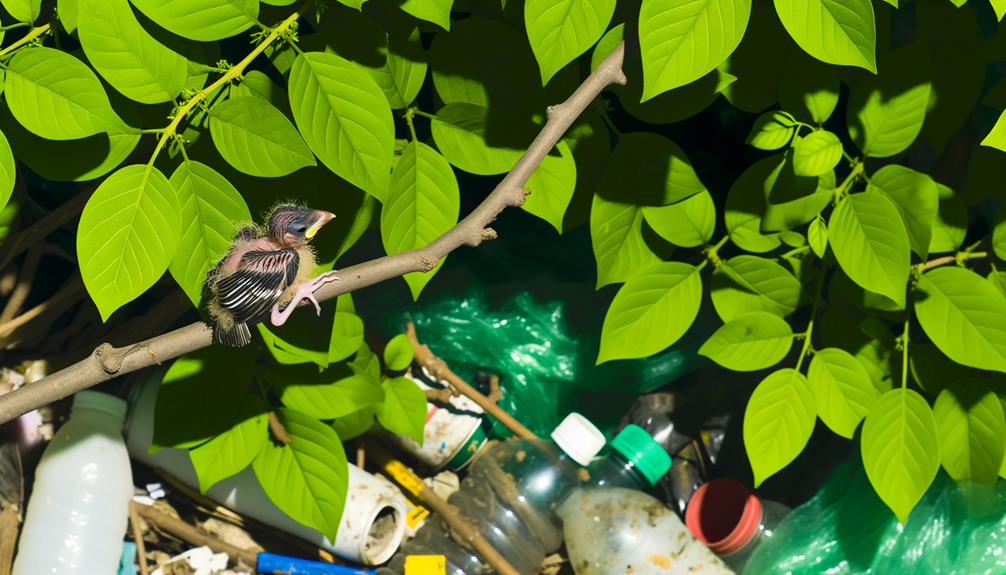
You should be aware that baby sparrows are highly susceptible to environmental hazards. Pollutants in nesting areas can compromise their respiratory health, while temperature fluctuations can lead to hypothermia or heat stress.
Additionally, pesticide exposure poses significant risks, potentially disrupting their neurological development and immune function.
Pollutants in Nesting Areas
Exposure to pollutants in nesting areas greatly compromises the health and development of baby sparrows, leading to increased vulnerability to various diseases. Contaminants like heavy metals, pesticides, and industrial chemicals impair their immune systems and disrupt endocrine functions. Research indicates that these pollutants cause oxidative stress, cellular damage, and impaired growth.
When nesting materials are contaminated, baby sparrows ingest toxins through preening and feeding, exacerbating their health risks. Studies have shown that even low levels of pollutants can lead to significant morbidity and mortality in avian populations.
Temperature Fluctuation Impact
Temperature fluctuations pose significant environmental hazards to baby sparrows by disrupting their thermoregulation and increasing susceptibility to illness. Regulating body temperature is vital for neonate sparrows, and deviations from ideal conditions can lead to hypothermia or hyperthermia.
These temperature extremes compromise their immune function, making them more vulnerable to pathogens.
Consider these impacts:
- Thermal Stress: Rapid temperature changes cause physiological stress.
- Hypothermia Risk: Cold temperatures can lower body temperatures critically.
- Hyperthermia Risk: Excessive heat can lead to overheating and dehydration.
- Immune Suppression: Temperature stress weakens the immune response.
- Developmental Issues: Chronic temperature instability can hinder growth and development.
Understanding these risks helps you provide more effective care and support for baby sparrows, ensuring their healthy development and reducing morbidity rates.
Pesticide Exposure Risks
Pesticide exposure poses a significant threat to baby sparrows by compromising their neurological development and immune function. You'll find that neurotoxic compounds in pesticides can disrupt synaptic transmission and brain development, leading to cognitive deficits and impaired motor skills.
Concurrently, these chemicals weaken the immune system, making the chicks more susceptible to infections and diseases. Research indicates that even low levels of pesticide residue in their food and environment can result in chronic health issues.
As someone committed to serving others, you should advocate for the reduction of pesticide use in sparrow habitats. By promoting organic farming and integrated pest management, you're not only protecting these vulnerable birds but also contributing to a healthier ecosystem.
Injury and Trauma
When baby sparrows experience injury and trauma, their small size and developing immune systems make them particularly vulnerable to complications and infections. Immediate and appropriate interventions are vital to mitigate these risks.
You should be aware of common injuries and their implications:
- Fractures: Often result from falls or predator attacks; require immobilization and sometimes surgical intervention.
- Lacerations: Open wounds can lead to severe infections if not properly cleaned and treated.
- Concussions: Head injuries may cause neurological damage, necessitating prompt veterinary evaluation.
- Hypothermia: Injured nestlings are prone to rapid heat loss, needing external warmth.
- Internal Injuries: Less obvious but potentially fatal; monitoring for signs of distress is essential.
Understanding these conditions helps you provide better care and improve survival rates for injured baby sparrows.
Preventative Measures
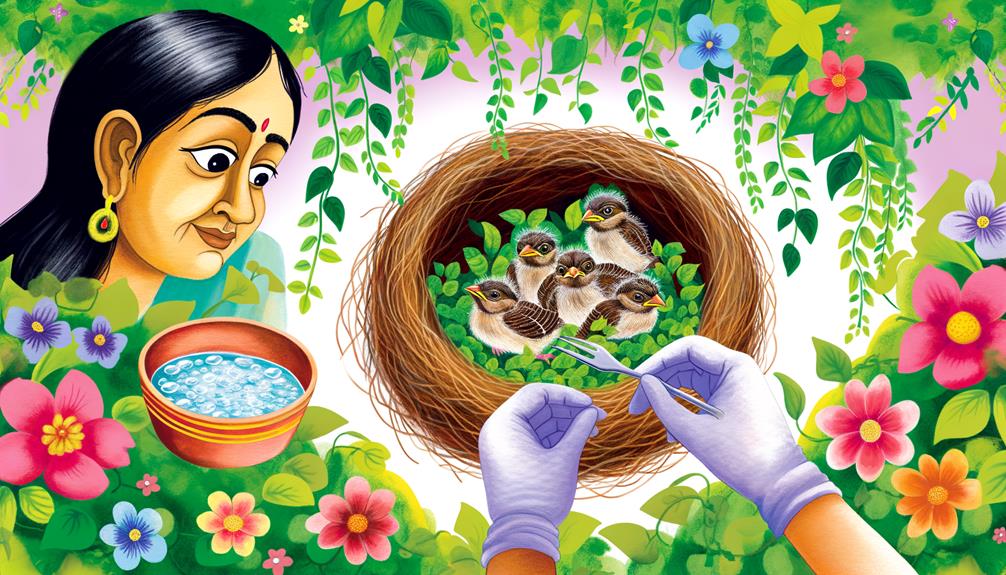
Implementing effective preventative measures is important to safeguarding baby sparrows from illness and injury. Begin by ensuring their habitat is clean and free from contaminants.
Regularly disinfect nesting areas to minimize the risk of bacterial and viral infections. Provide a balanced diet rich in essential nutrients to bolster their immune system.
Monitor for signs of parasitic infestations, and employ appropriate prophylactic treatments. Maintain ideal temperature and humidity levels, as extreme conditions can weaken their health.
Encourage natural behaviors like preening and dust bathing, which help maintain their plumage and overall well-being. By integrating these evidence-based practices, you'll create a healthier environment that supports the thriving development of baby sparrows, fostering resilience against potential health threats.
Treatment Options
Should baby sparrows fall ill despite preventive measures, prompt and appropriate treatment options must be employed to address their health issues effectively.
You should consider employing the following evidence-based interventions to secure the best outcomes for these delicate creatures:
- Hydration Therapy: Administer electrolyte solutions to prevent dehydration.
- Nutritional Support: Provide a balanced diet rich in proteins and vitamins.
- Antimicrobial Medications: Use prescribed antibiotics or antifungals to combat infections.
- Environmental Control: Maintain a clean, warm, and stress-free habitat.
- Monitoring and Record-Keeping: Regularly document symptoms and progress.
When to Seek Help

If a baby sparrow shows persistent symptoms or worsening conditions despite initial treatment efforts, seeking veterinary assistance immediately is necessary. Symptoms to watch for include labored breathing, lethargy, continuous diarrhea, or a refusal to eat. These signs could indicate underlying infections or metabolic issues that require professional intervention.
Avian veterinarians possess specialized knowledge to diagnose and treat ailments in baby sparrows effectively. Delaying expert care can worsen the bird's condition, reducing its chances of recovery. Always prioritize the sparrow's health by consulting with an avian specialist as soon as concerning symptoms arise. Your prompt action could be the difference between life and death for the vulnerable bird.
Conclusion
To safeguard your baby sparrow thrives, vigilance is your best ally. Recognize common illnesses early—whether respiratory infections, gastrointestinal issues, or parasitic infestations. Watch for signs like lethargy or abnormal droppings, and act swiftly.
Preventative measures, like maintaining a clean habitat, are your sparrow's shield. If illness strikes, prompt treatment can be a lifeline. Remember, when in doubt, seek professional help.
Your attentive care is the fortress protecting your delicate feathered friend from the storm of sickness.


